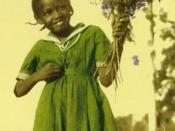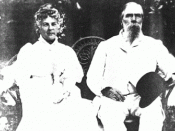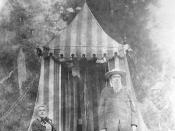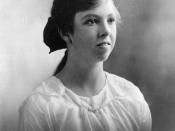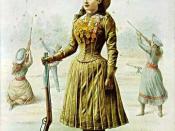In the novel Annie John, Jamaica Kincaid analyses the adolescence of a girl and her difficulties in separating from her mother. Although it is common for the teen years to be painful ones on both mothers and daughters, the separation of the child from the family is usually initiated by the child, while the parent is reluctant to give up control. The choice that an adolescent makes in deciding when and how one will distance oneself from a parent can be empowering to the child, to take this choice away from the child can be equally devastating. Kincaid's book is the story of a mother who clearly decides for the daughter when this change will happen in their lives. Because the daughter has no choice about the timing of the separation, it is very difficult for her. While the daughter is lost without the mother at her side, the mother appears to be enjoying her new freedom.
Based on the viewpoint of the angry daughter, the mother, who has no voice in the book, is portrayed as a bad parent. Their ruined relationship is a statement about the powerlessness of being a child as well as the nature of motherhood as an agent in driving this mother to action.
Judith Viorst in Necessary Losses gives some explanation as to why this parent initiated separation can be so difficult on the child.
"In the phase that Freud labeled 'latency' - which is usually dated from ages seven to ten - we leave the benevolent fortress of family life. Our job as a latency kid is to acquire the social and psychological know-how without which we can not manage this new separation, these new losses. ... But unless we have arrived at latency having established a separate self...we will have trouble taking on these tasks."(p.143) The developmental stages that are described above are ones on which Kincaid focuses in her book. As this mother forces the birth of her adult child, it is as traumatic as the birth of a newborn with the added dimension of rejection and anger. Annie has no choice in the matter; she is unable to make this transition into adolescence smoothly given her abrupt launching into this developmental phase. Annie has not arrived at this stage having any separate self from her mother and therefore has difficulties taking on the tasks of acquiring social and psychological know-how to help her deal with life and relationships, especially the relationship she has with her mother.
Using the daughter perspective forces the reader to think about the vulnerabilities of the child within the family. As the mother's power is wielded, the daughter is subject to her decisions. The main difficulty for Annie is the difference between feeling rejected verses choosing distance. The mother's decision to separate herself from her daughter so abruptly takes control away from Annie, control necessary for her development. For Annie, this separation seems more devastating than even a death might have been, because her faith in her one true love, her mother, dissolves. Prior to this mother daughter separation, Annie reflected on her parents, "I loved [my father] so and wished that I had a mother to give him, for no matter how much my own mother loved him, it could never be the same."(Kincaid p.24) Annie's faith in her mother's love is so clear in this quote, proving that it is unimaginable to Annie that this might ever end. Yet when the mother decides it is time for her daughter to grow up, Annie has no say in the matter; she seems quite helpless. This process began at age twelve for Annie, just when she begins to physically change. At this awkward stage in life, Annie's mother sets up some new boundaries which devastate Annie. Although they had always bought fabric to make similar dresses, one day the mother replies to Annie's request of yet another matching dress with "'Oh, no. You are getting too old for that. It's time you had your own clothes. You can not go around the rest of your life looking like a little me.'"(p.26) In deliberating on the event, Annie thinks, "It wasn't just what she said, it was the way she said it.... In the end I got my dress with the men playing their pianos, and my mother got a dress with red and yellow overgrown hibiscus, but I was never able to wear my own dress or see my mother in hers without feeling bitterness and hatred, directed not so much toward my mother as toward, I suppose, life in general."(26) The mother makes her comments in such a way that belittle Annie and make her feel insecure about herself and her environment. The vulnerable nature of this young child combined with the powerlessness Annie feels, make Annie angry at her mother and the world.
Another result of the mother rejecting Annie is Annie's decision to fight back and rebel against her mother. During latency, the healthy child "will discover, with amazement and relief, that parents are fallible" and will also go through an intense period of growth where the child "will begin to acquire a feeling of mastery."(Viorst p.143) Not unlike many girls her age, for Annie both of these things are true, yet Annie's rebellion is the focus of her energy and it is consciously directed against her mother. It was a game for Annie to learn and master the very things that her mother had wished she would not, "once my mother said to me, 'I am so glad you are not one of those girls who likes to play marbles,' and perhaps because I had to do exactly the opposite of whatever she desired of me, I now played and played at marbles in a way that I had never done anything."(61) Similar to other children, Annie found fault with her mother, but unlike other children, in the moments where there should have been some tenderness between mother and daughter, Annie despised the beauty she saw in her mother and distrusted her mother's actions and words. After being sent home from school by the nurse, Annie reflects, "[w]hen I got home, my mother came toward me, arms outstretched, concern written on her face. My whole mouth filled up with a bitter taste, for I could not understand how she could be so beautiful even though I no longer loved her."(53) Annie's anger and rebellion exists primarily because she feels rejected by her mother, something that could have been avoided had the mother allowed Annie to choose the distance herself. By the mother pre-empting the separation, she has taken all power and control away from the daughter.
A lack of communication between the mother and daughter prolongs the negative feelings Annie has for her mother for an indefinite amount of time. The daughter never openly questions the mother about her actions and is never able to see why the she acted the way she did. Even at the end of the book there has been no resolution between them. Annie has decided that she will never see her parents again, and the parents seem to be in the dark with regard to how Annie considers them. She is incapable of getting beyond the rage she feels towards her mother. It sets her off to a career in which she is not interested, simply to get away from her mother and all that is a reminder of her. Their lack of communication towards one another is destructive to any of the good that existed between them, and although the daughter still has some pleasant memories, Annie is unable to celebrate or enjoy any of them because she is so bitter towards her mother.
Although the mother's perspective is unknown to the reader, since the daughter is the narrator of the story, the reader sees glimpses of the mother's life through the child's eyes and cannot help but wonder about the reasoning behind her abrupt actions. In Annie's youth, she and her mother were one and the same in so many ways. They share everything; they even wear the same clothing. As the mother saw the physical changes in her daughter, societal pressures may have indicated to her that it was time for Annie to grow up. In doubting her own mothering style, possibly a smothering one which would not allowing the daughter to grow naturally into the next phases of development, the guilt may have led to her actions. In My Mother My Self, Nancy Friday tells of the fears of a mother, "[t]he girl is a projection of herself, she loves [the daughter] as she loves herself. And so she sees all her own fears magnified in her daughter."(70) If the mother has created the daughter and this creation is a reflection on herself, the mother would naturally want her daughter to grow in a developmentally age appropriate way. Since this was not happening by itself, her fear or guilt that she is not mothering correctly pushes her to force the issue.
A study of the mother she was prior to their separation and the one she became after may offer a different view of her actions. The lifestyle that the mother and daughter led, before the summer when everything changed, must have been a stifling one for the mother. She had sacrificed her friendships with adults including her husband who according to Annie had affairs with other women. The mother did what was expected of her as a parent and it was draining on her life. All of this changes with the separation of mother from daughter. The mother is thinking about her personal life again, where as prior to this juncture there was no distinction between the mother and the daughter's life. Annie is jealous of the happiness her mother seems to have gained. Annie struggles with adolescent rituals and some of the limitations of being that age, and yet the mother seems very content with her newfound freedom. While it is impossible to begrudge the mother the life she has gained, it is possible to criticize the process through which it happened, or the forces at work behind her decision. The traditional role of mothering has put this mother in an awkward position of being torn between wanting her own life and wanting the best for her daughter and possibly making bad decisions because of this conflict.
Given the stressful and demanding nature of motherhood combined with the onset of her daughter's adolescence, the mother's instincts tell her it is time to move on. Although her instincts may be correct, acting on them in the manner that she does is another story. Her method of separation is much like an animal's instinct, such as a mother bird who would throw her baby bird out of it's nest. Friday discusses this in her book, "The skills we must learn are too complex to be left to animal instincts alone. ... while we say that maternal instinct plays a role in mothering a human child, it is clear that instinct alone could never do the whole job. It has to be supplemented by skills, arts, emotions, and desires humans have learned from other humans."(15) While Kincaid is introducing the reader to a situation in which the mother has acted to an extreme to gain control of her own life, this is not the same as saying that the mother's desires are unreasonable. There is nothing to support the idea that the mother is a neglectful or bad mother once she has made the break from her daughter. She simply has become a very different mother than the one she was previously. It is only the sudden shift in character which is the problem, and the insensitivity involved in the mother's actions with regard to her daughter's feelings. Kincaid's commentary on motherhood can be seen as criticism of societal pressures which demand a mother to behave in ways which may not be natural to her. This mother must have been 'acting' as the mother she thought she should be, not as what really came naturally to her. She felt pressure to behave in a way that forced her to give up her own life. Kincaid presents a scenario in which the pressure to be a 'good mom' drives the mother from one extreme of motherly sacrifice to another extreme of claiming her life back.
This move on the mother's part has horrible effects on her relationship with her daughter, who is bitter when recalling the events which distanced mother from daughter. The initial disgust we feel towards the mother for abandoning her baby is mostly because we are not given her viewpoint. The daughter's perception of what happened between her mother and her is the only thing put forth and it is what sways the reader against the mother. The reader never sees the internal struggles of the mother which may have led to her decision. Not giving the mother's perspective is indeed doing what Marianne Hirsh argues against in her book The Mother Daughter Plot. "The story of female development, both in fiction and theory, needs to be written in the voice of mothers as well as in that of daughters. It needs to cease mystifying maternal stories".(p.161) Annie John could very well be read as an example of how a mother has ruined her relationship with her daughter an possibly caused other developmental damage. I refuse to only see that view; Hirsh supports this by adding to her above quote, "[o]nly in combining both voices, in finding a double voice that would yield a multiple female consciousness, can we begin to envision ways to 'live afresh.'"(161) In hearing the mother's perspective, I believe the reader may have come away from this book with a more sympathetic view towards the mother, instead of just wondering why, why, why, when closing the book.
